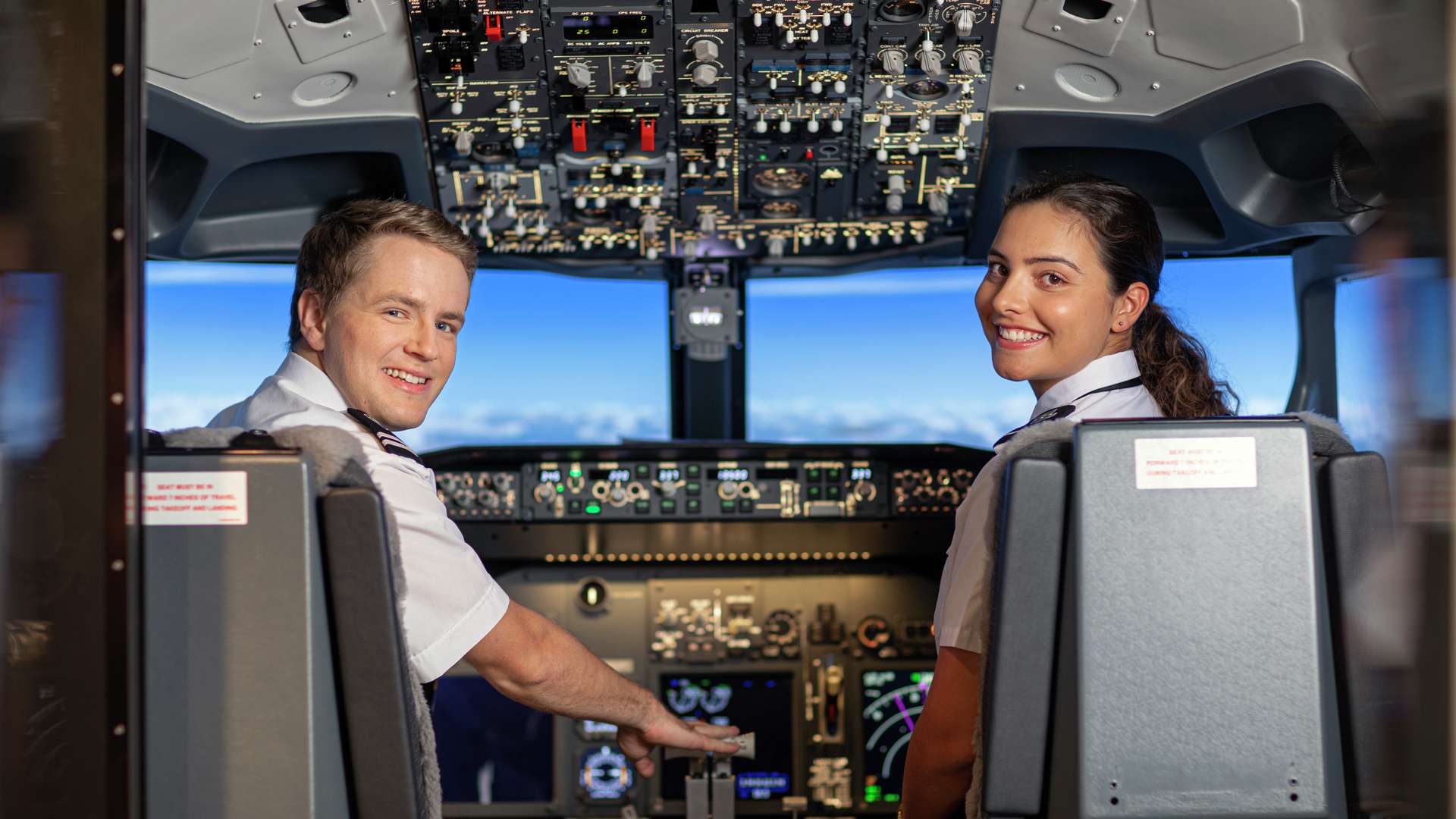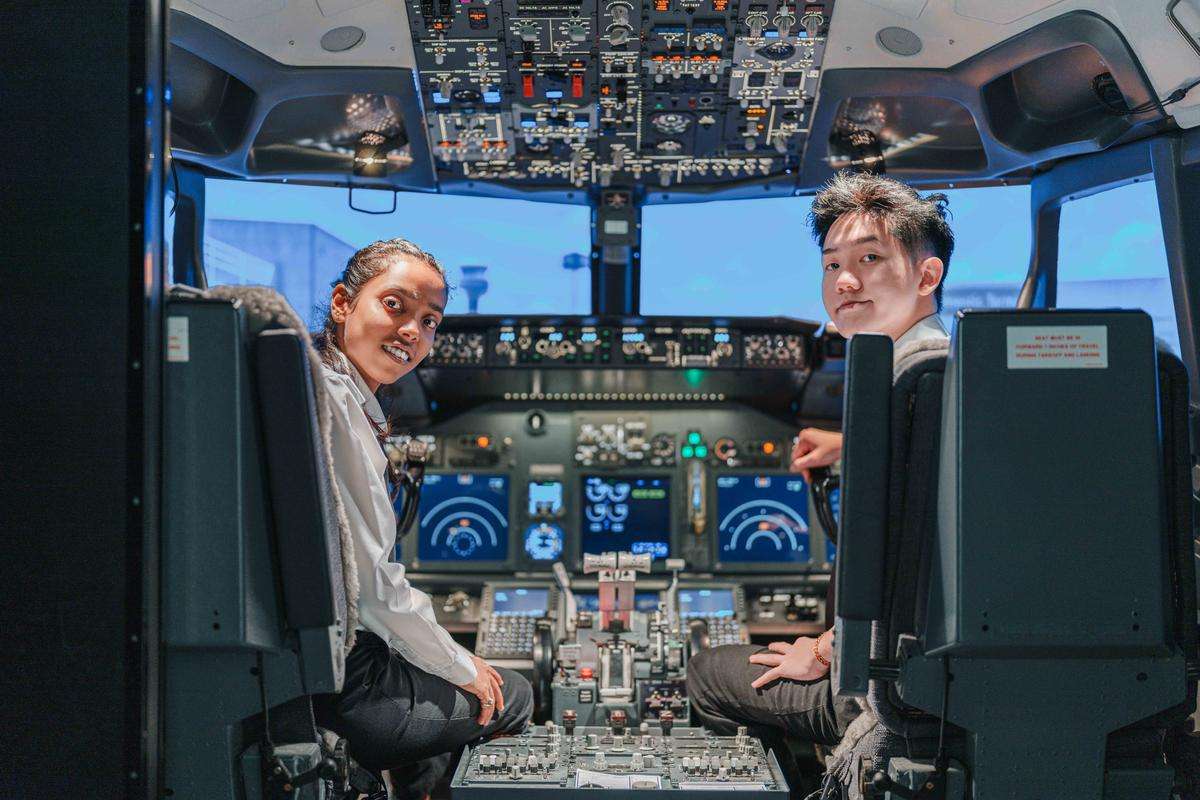Bachelor of Aviation (Commercial Pilot)

Overview
If your career aspiration is to become a professional commercial airline pilot capable of managing a multi-crew environment, then the Bachelor of Aviation (Commercial Pilot) will prepare you for this. The degree will provide you with the knowledge, skills and experience to satisfy the requirements for a Commercial Pilot Licence and Command Instrument Rating, and to become a commercial pilot.
The Bachelor of Aviation (Commercial Pilot) can be packaged with an optional Test of English for Aviation Preparation course.
The Bachelor of Aviation (Commercial Pilot) will prepare you for a career as a commercial pilot. In this course, you will gain the aeronautical knowledge and experience required to achieve a Commercial Pilot License, Multi-Engine, and Command Instrument Rating and meet the Australian educational standards for a Bachelor Degree.
In the first term of your study, you will prepare for flight training by learning about the aviation industry, the fundamentals of flight, and aviation safety. In your second term, you will begin your flight training and start Commercial Pilot License (CPL) theory coursework.
During your second year of study, you will continue fight training and CPL theory coursework, as well as undertaking more advanced theory courses in human factors and safety.
During your third year, you will complete your flight training and achieve a Commercial Pilot License and Multi Engine Command Instrument Rating. You will also undertake a capstone Aviation Project that will provide you with the opportunity to showcase your knowledge and analytical skills through the presentation of a research project on an approved aviation-related topic.
Units in this course that include flight training are delivered by a third party provider. Flight training costs are estimates and subject to change according to the provider.

Transcript
Right now, the aviation industry is really, really in need of experienced pilots, managers and engineers. We need over 700,000 pilots, 800,000 managers and we need a million engineers in the next 20 years to keep our industry growing.
We fly around 4 billion passengers a year, and they want to double that to 8 billion. So, we have opportunities.
And plus, the airlines, they want to see somebody with a university degree because you are a proven commodity that you know how to study.
The Bachelor of Aviation (Commercial Pilot) is designed for international students, and it is a tip to tail.
Students come here and they learn all the theory and all the flying is done within the program so that they end year three with a commercial pilot license multi-engine instrument rating.
In the first year of training, they start with the theory, and they begin with learning our industry, and we teach them about aviation management.
In year two, they start focusing purely on their flying, their commercial pilot license theory courses. They have to take our exam and then they go and they take the CASA exam immediately. So, they maintain that knowledge level that they can get in and be successful in these exams.
In year three, we put them into more human-factors type of training where they get to fly in our 737 simulator and learn what it takes to be a teammate in a real environment. It's a very good program.
Our teaching team here is very strong in their skill sets. They are airline pilots themselves, mainly captains, with years of experience and thousands of hours.
My favourite facilities that I like from school is the simulation room — it's the one of the best simulations I have ever been in my life. It's so realistic and I have lots of fun and good experience for my professors there.
Secondly, is the location of the campus — also my classroom, which allows me to look through the window to the airport and the runway to see the airplanes take-off and land. So, it motivates me to attend school every day and also inspire me to work in the airport someday in the future.
We currently have an arrangement with one of our regional partners here that our students, can get some aircraft flying time in.
Our flight training program begins in year one for our international students, and they will do one subject where we're teaching them on a desktop simulator how to fly a 172 aircraft. And then literally within a few weeks, they're actually flying in a 172 aircraft with one of our flight providers here at Cairns International Airport.
Our students have the opportunity to be a part of the Qantas Aviation Career Enrichment Program, which also gives them the benefit of having access to Qantas mentoring as well as opportunities to potentially fly with Qantas.
My advice to somebody who wanted to study aviation is you have to commit yourself, and you have to be prepared to study — and multiple subjects — at the same time. And we have resources here at CQU that are available to help our students, but you have to commit yourself and it's rather challenging.
Our students, when they leave CQU, you are going to be working in the best office in the world at 40,000ft. You cannot beat the view!
- “
The classroom is so unique, I can see the aeroplanes and the runway through my classroom window, and the simulator is one of the best I've seen! It's so realistic and I can apply the knowledge to a real-life situation.
Minh Triet Le
Bachelor of Aviation (Commercial Pilot) | Vietnam
- “
Learning to fly at an international airport like Cairns has been a game-changer. Communicating with ATC and navigating real weather conditions is shaping me into a confident pilot.
Mahima Chaudhary Kalwar
Bachelor of Aviation (Commercial Pilot) | Nepal
Career Opportunities
When you graduate with the Bachelor of Aviation (Commercial Pilot) you will meet the aeronautical knowledge and experience requirements for careers as a commercial pilot in the air transportation industry. You would normally be legally qualified to work as a commercial pilot and have access to aviation careers in the air transportation industry, or a cadetship/ traineeship offered by some airlines. With additional flight training, you can explore opportunities in general aviation such as; flight instructing, tourism operations and agricultural operations such as mustering and crop spraying.
Structure & Availability
The course structure and available locations can change depending on when you want to study. You can choose the intake that best suits you in the drop-down menu below.
Available Locations
Your Course
You must complete 19 units (144 credits):
- 1The core structure (19 units)
Unit Details
The units you'll study are listed below. Click on a unit to learn more.
Additional Information
Multi Crew Cooperation - AVAT13013
In the third year, AVAT13013 includes flight training in a CASA-approved simulator. AVAT13013 provides the students with the “Certificate of Completion -Multi-Crew Cooperation” for successful completion of all training requirements prescribed in the Aviation Australia Multi Crew Cooperation (MCC) course pursuant to Part 61 and Part 142 of the Civil Aviation Safety Regulations 1988 (CASR).
The course includes flight training of up to 227.3 hours total time (207.3 hours flight time and 20 hours simulator time), 100 hours of pilot in command time and 46 hours of instrument time.
This should be sufficient to obtain your Australian Commercial Pilot Licence (CPL) and a Multi Engine Command Instrument Rating (MECIR).
If you require extra flight hours to reach the required standard for each unit, there will be additional costs, see the Handbook under 'More Details'.
If you have already completed a study relevant to the course you have enrolled in, you may be eligible for credit transfer.
Requirements
To Be Eligible
For your application to be considered, you must meet the following entry requirements.
During Your Study
While not needed to apply, you'll need to meet the following requirements throughout your studies.
Fees & Scholarships
Course Fees
This is an approximate cost of enrolling in this course, shown in Australian dollars (A$), for one academic year and is based on a full-time study load (8 units over 2 terms).
The estimated course fee quoted does not include the flight training fee. The flight training costs are determined by the flight training provider, and these costs may be subject to change.
Any additional hours of flight training that you may need to undertake or repeat will be an additional cost – an indicative cost of A$600 per hour for single-engine aircraft, and A$870 per hour for a twin-engine aircraft.
Fees are reviewed each year and are subject to change.
Scholarships are not available for this course.
In addition to your international course tuition fees, you must have sufficient funds to cover other study and living expenses.
This will include costs such as textbooks, accommodation, visa applications, Overseas Student Health Cover (OSHC), general living, etc.
How to Apply
Our easy to use online application system for international students will guide you through the process of applying for a course at CQUniversity Australia.
